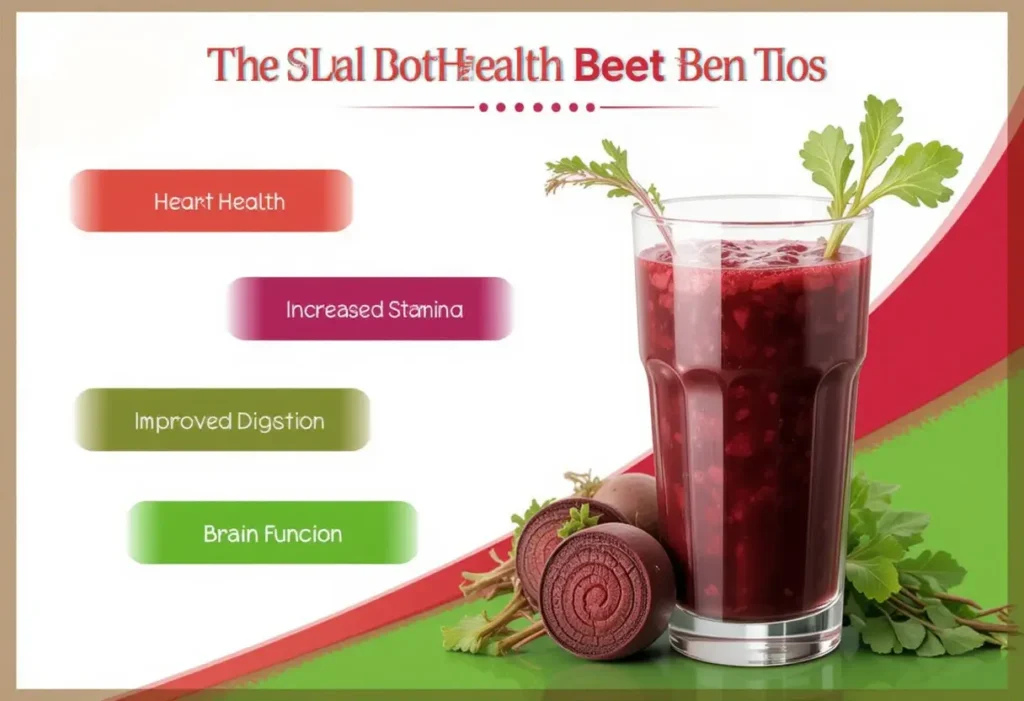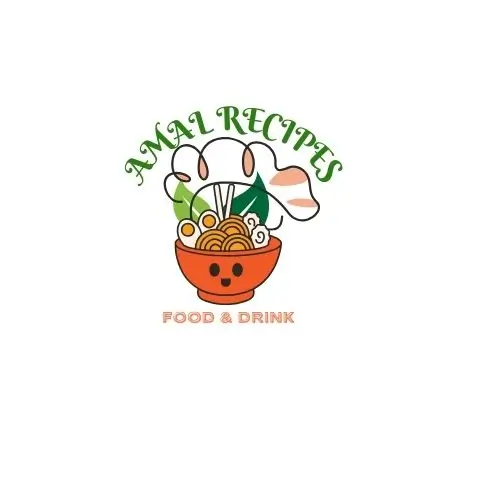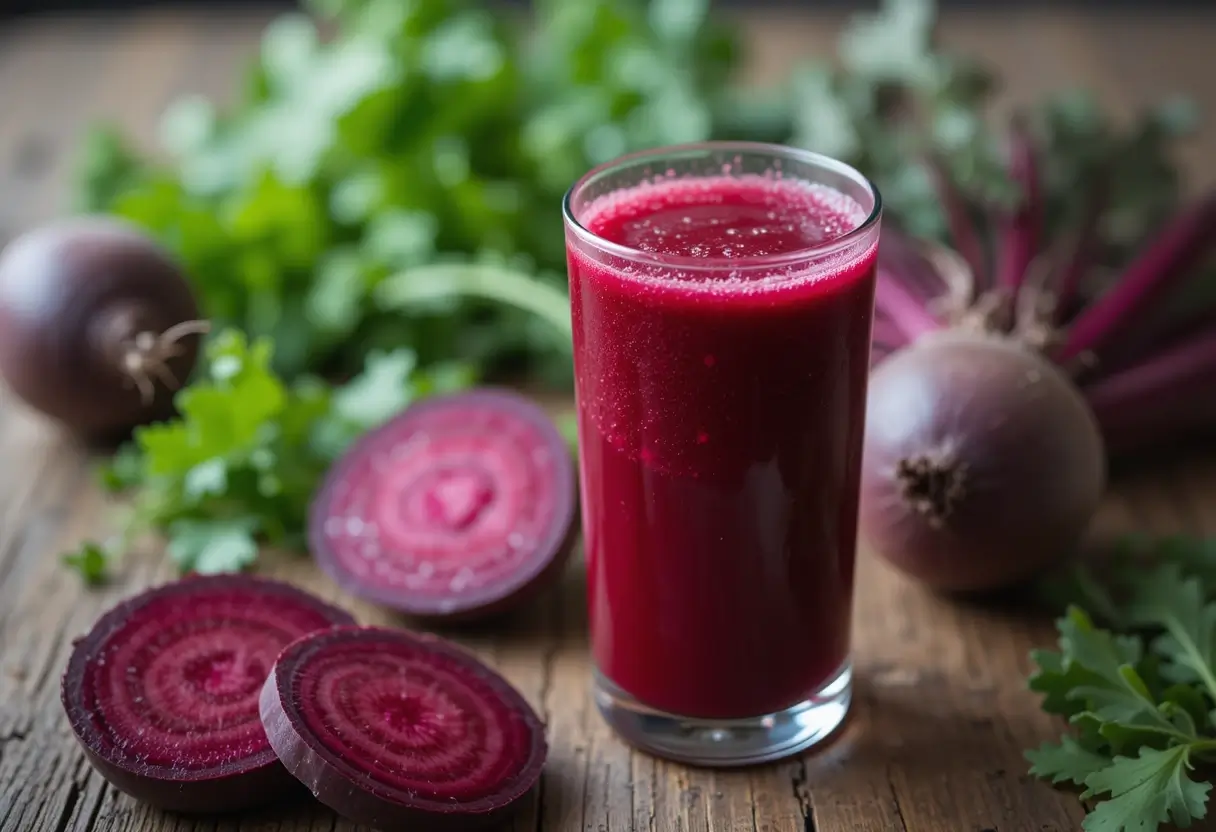Table of Contents
Beet Juice Benefits: A Natural Elixir for Health and Vitality
Beet juice has taken the health world by storm, and for good reason! Packed with essential nutrients, antioxidants, and nitrates, this vibrant red elixir offers a powerhouse of benefits, from boosting heart health to enhancing athletic performance.
The Rise of Beet Juice in Health and Wellness
Why Is Beet Juice So Popular?
Health trends come and go, but beet juice has secured a lasting spot in wellness circles. Its rich nutritional value and scientifically backed health benefits make it more than just a passing fad. Whether it’s athletes aiming to boost performance or individuals managing high blood pressure, beetroot juice has proven to be a game-changer.
A Brief History of Beet Juice and Its Traditional Uses
Beets (Beta vulgaris) have been cultivated for centuries, originally prized for their leaves before people discovered the incredible properties of the root. Ancient civilizations, including the Romans and Greeks, used beets for medicinal purposes—believing in their ability to purify the blood and promote vitality.
Today, science backs what traditional medicine has long known: beet juice benefits extend far beyond just being a natural food dye! From cardiovascular support to anti-inflammatory effects, this juice is a nutritional powerhouse waiting to be explored.
What Sets Beet Juice Apart from Other Superfoods?
While many superfoods boast antioxidants and vitamins, beetroot juice stands out due to its high nitrate content. Unlike leafy greens, which also contain nitrates, beet juice offers a concentrated dose that quickly converts into nitric oxide in the body, leading to improved blood flow, enhanced stamina, and better oxygen delivery to muscles and the brain.
Moreover, betalains, the pigments responsible for beet juice’s deep red color, provide strong anti-inflammatory and detoxifying properties, making it a natural cleanser for the liver and blood.
Who Can Benefit the Most from Drinking Beet Juice?
Although beet juice offers health perks for almost everyone, some groups can particularly benefit:
- Athletes & Fitness Enthusiasts – Increases endurance, oxygen uptake, and muscle efficiency.
- Individuals with High Blood Pressure – Helps relax blood vessels, leading to lower blood pressure.
- People Seeking Natural Detox Solutions – Supports liver function and promotes toxin elimination.
- Cognitive Health Advocates – Enhances brain function by improving circulation.
Key Nutrients in Beet Juice
What Makes Beet Juice So Nutritious?
Beet juice isn’t just a trendy drink—it’s a nutrient-dense powerhouse packed with essential vitamins, minerals, and bioactive compounds. Every sip fuels your body with elements that promote heart health, boost energy levels, and support overall wellness.
Unlike many other vegetable juices, beet juice provides a concentrated dose of nitrates, antioxidants, and betalains, making it uniquely beneficial for multiple bodily functions. But what exactly is inside this vibrant red elixir? Let’s break it down!
Essential Vitamins and Minerals in Beet Juice
Beet juice is a natural multivitamin, delivering a spectrum of key nutrients your body craves:
- Vitamin C – A potent antioxidant that strengthens the immune system, enhances collagen production, and supports healthy skin.
- Folate (Vitamin B9) – Essential for red blood cell production, DNA synthesis, and fetal development during pregnancy.
- Potassium – Helps regulate blood pressure, muscle contractions, and nerve signals.
- Iron – Crucial for oxygen transport in the blood and preventing anemia.
- Magnesium – Supports muscle function, nerve signaling, and energy production.
- Manganese – Plays a vital role in metabolism, bone formation, and antioxidant activity.
The Power of Natural Nitrates in Beet Juice
One of the most talked-about components of beet juice is its high nitrate content. When consumed, nitrates are converted into nitric oxide, a molecule that:
✅ Expands blood vessels, improving circulation and lowering blood pressure.
✅ Boosts oxygen delivery, enhancing athletic endurance and muscle efficiency.
✅ Supports brain function, reducing cognitive decline by increasing blood flow to the brain.
Compared to other nitrate-rich vegetables like spinach and arugula, beet juice provides a more concentrated and easily absorbable source, making it an excellent natural supplement for heart and vascular health.
Betalains: The Antioxidants That Give Beet Juice Its Deep Red Color
The vibrant color of beet juice comes from betalains, a unique class of antioxidants known for their anti-inflammatory, detoxifying, and free-radical-fighting properties. Studies suggest betalains:
- Help reduce oxidative stress, which contributes to aging and chronic diseases.
- Support liver detoxification, aiding in the removal of toxins from the body.
- May have anti-cancer properties, as they help neutralize harmful compounds in the body.
Beet Juice vs. Whole Beets: Does Juicing Reduce Nutritional Value?
A common question is whether juicing removes fiber and other nutrients from whole beets. While beet juice does lack the fiber found in whole beets, it allows for faster absorption of nitrates and antioxidants into the bloodstream.
For those looking for a balance, pairing fresh beet juice with whole beets in salads or smoothies ensures you get the best of both worlds—quick nutrient absorption plus gut-friendly fiber!
Health Benefits of Beet Juice
Why Is Beet Juice Considered a Superfood?

With its powerful combination of nitrates, antioxidants, and essential vitamins, beet juice offers a wide range of health benefits. From improving blood circulation to boosting athletic endurance, this vibrant elixir does more than just add color to your diet—it actively enhances your well-being.
Let’s dive into the top science-backed benefits of beet juice and how it can support your overall health!
1. Supports Cardiovascular Health 💓
Beet juice is one of the best natural remedies for heart health due to its high nitrate content. Once consumed, these nitrates convert into nitric oxide, a molecule that:
✅ Lowers blood pressure by relaxing blood vessels and improving circulation.
✅ Enhances oxygen flow, reducing strain on the heart.
✅ May prevent heart disease by reducing arterial stiffness.
A study published in the Journal of the American Heart Association found that drinking beet juice daily can significantly lower systolic blood pressure. For those with hypertension, incorporating one glass of beet juice per day may help maintain healthy blood pressure levels.
2. Boosts Athletic Performance and Stamina 🏃♂️💪

Looking for a natural energy boost? Beet juice has gained popularity among athletes and fitness enthusiasts for its ability to:
🔹 Increase endurance by improving oxygen efficiency.
🔹 Delay muscle fatigue, allowing for longer workouts.
🔹 Enhance muscle recovery, reducing soreness post-exercise.
A study published in Nutrients found that athletes who drank beet juice before workouts performed better in endurance exercises, experiencing 15% increased stamina. This makes beet juice an ideal pre-workout drink for runners, cyclists, and gym-goers.
3. Enhances Brain Function and Cognitive Health 🧠
As we age, maintaining brain health becomes a top priority. The nitric oxide boost from beet juice plays a key role in brain function by:
✅ Increasing blood flow to the brain, particularly in areas related to cognitive function.
✅ Reducing the risk of neurodegenerative diseases like dementia.
✅ Improving memory and concentration in both young adults and seniors.
A study from The Journals of Gerontology showed that older adults who drank beet juice before exercise experienced improved cognitive function compared to those who didn’t.
4. Fights Inflammation and Oxidative Stress 🔥
Chronic inflammation is linked to various diseases, including arthritis, diabetes, and heart disease. The betalains and antioxidants in beet juice help:
🔹 Reduce inflammation in joints and tissues.
🔹 Neutralize free radicals, protecting cells from damage.
🔹 Support immune health, keeping your body resilient against infections.
Regular consumption of beet juice may help manage inflammatory conditions naturally, making it a great addition to an anti-inflammatory diet.
5. Aids in Liver Detoxification 🏥
Your liver is the body’s detox powerhouse, and beet juice plays a vital role in supporting its function by:
✅ Flushing out toxins, thanks to betalains and antioxidants.
✅ Reducing liver fat accumulation, which is especially beneficial for individuals with fatty liver disease.
✅ Promoting bile production, improving digestion and nutrient absorption.
6. May Help Regulate Blood Sugar Levels 🍬
While beet juice contains natural sugars, its low glycemic index prevents drastic spikes in blood sugar. Additionally, it:
🔹 Increases insulin sensitivity, helping the body use glucose more efficiently.
🔹 Provides steady energy, reducing sugar cravings.
🔹 May lower the risk of type 2 diabetes when consumed as part of a balanced diet.
For diabetics or those monitoring blood sugar levels, drinking beet juice in moderation may provide metabolic benefits without harmful sugar spikes.
Potential Risks and Considerations of Beet Juice
Is Beet Juice Safe for Everyone?
While beet juice offers a wealth of health benefits, it’s important to understand that not everyone should consume it in large amounts. Some people may experience side effects or interactions depending on their health conditions, medication use, or dietary sensitivities.
In this section, we’ll explore the potential risks of drinking beet juice, who should limit their intake, and how to enjoy it safely.
1. Can Beet Juice Cause Low Blood Pressure? 🩸
One of the primary benefits of beet juice is its ability to lower blood pressure—but for some people, this can become a concern. Since beet juice naturally increases nitric oxide production, it can:
✅ Cause blood pressure to drop too low in individuals already on hypertension medication.
✅ Lead to dizziness or lightheadedness, especially if consumed in excess.
✅ Worsen symptoms of hypotension (low blood pressure) in sensitive individuals.
💡 Tip: If you have low blood pressure or are on blood pressure medication, consult your doctor before making beet juice a daily habit.
2. Beeturia: Why Does Beet Juice Turn Urine and Stool Red? 💩
Have you ever noticed red or pink-colored urine after drinking beet juice? This harmless condition, known as beeturia, occurs due to the betalains in beets.
🔹 Beeturia is not dangerous and typically disappears once the body fully metabolizes the pigments.
🔹 It affects about 10-14% of people, especially those with low stomach acid or iron deficiency.
🔹 Some people may also notice reddish stool, which is completely normal.
3. Can Beet Juice Affect Kidney Health? 🏥
Beet juice contains high levels of oxalates, which can contribute to kidney stone formation in some individuals.
✅ People prone to kidney stones (especially calcium oxalate stones) should limit beet consumption.
✅ Excess oxalates can also interfere with calcium absorption, leading to mineral imbalances.
✅ Drinking large amounts of beet juice daily may increase the risk of kidney stone formation over time.
💡 Tip: If you have a history of kidney stones, speak with your doctor before consuming beet juice regularly.
4. Does Beet Juice Interact with Medications? 💊
Certain medications may interact with beet juice, especially those affecting blood pressure and blood thinning.
🔹 Hypertension medications – Beet juice can enhance the effects of blood pressure-lowering drugs, potentially leading to dangerously low blood pressure.
🔹 Blood thinners (like Warfarin) – Beets contain vitamin K, which can affect blood clotting and interfere with anticoagulant medications.
🔹 Diabetes medications – While beet juice has a low glycemic index, it still contains natural sugars that may slightly impact blood sugar levels.
5. Can Too Much Beet Juice Cause Stomach Discomfort? 🤢
Some people experience digestive issues after drinking beet juice, especially in high amounts.
✅ Bloating and gas – Due to its natural sugars and fiber content, beet juice may cause mild bloating in sensitive individuals.
✅ Diarrhea or stomach cramps – Drinking too much beet juice too quickly can have a mild laxative effect.
✅ Acid reflux concerns – Beets are naturally acidic and may worsen acid reflux in people prone to heartburn.
💡 Tip: Start with a small amount (half a cup) of beet juice and gradually increase your intake to avoid digestive discomfort.
How to Enjoy Beet Juice Safely ✅
To maximize beet juice benefits while minimizing potential risks, follow these tips:
🔹 Limit intake – Stick to ½ to 1 cup per day to avoid unwanted side effects.
🔹 Dilute with water or other juices – Mixing beet juice with carrot, apple, or cucumber juice can help balance its potency.
🔹 Monitor your body’s response – If you notice dizziness, stomach issues, or other discomforts, reduce your intake.
🔹 Consult your doctor – Especially if you have kidney issues, low blood pressure, or take medications.
How to Make and Enjoy Beet Juice for Maximum Benefits
Why Fresh Beet Juice Is the Best Option
Drinking freshly made beet juice ensures you get the highest concentration of nutrients, free from preservatives and added sugars found in store-bought versions. Making beet juice at home also allows you to customize the flavor and balance its natural earthiness with other ingredients.
In this section, we’ll cover how to make beet juice, the best ingredient combinations, and creative ways to enjoy it!
1. Simple Homemade Beet Juice Recipe 🍹
This quick and easy beet juice recipe ensures you get the maximum health benefits while balancing flavor.
Ingredients:
- 2 medium-sized beets (peeled and chopped)
- 1 apple (for natural sweetness)
- 1 carrot (adds extra nutrients and mild sweetness)
- ½ lemon (for freshness and vitamin C boost)
- 1-inch piece of ginger (aids digestion and enhances flavor)
- 1 cup of water (optional, for a thinner consistency)
Instructions:
- Wash and peel the beets, apple, and carrot. Cut them into small pieces.
- Add all ingredients to a juicer and process until smooth.
- If using a blender, add 1 cup of water, blend well, and strain through a fine-mesh sieve or cheesecloth.
- Pour into a glass and enjoy immediately for the best nutrient absorption!
2. Best Beet Juice Combinations for Different Health Benefits
Beet juice pairs well with other ingredients, enhancing both taste and health benefits. Here are some great combinations:
✅ For Detox & Liver Health: Beet + Carrot + Lemon + Ginger
✅ For Heart Health & Circulation: Beet + Pomegranate + Celery
✅ For Energy & Stamina: Beet + Apple + Spinach + Banana
✅ For Digestive Health: Beet + Pineapple + Cucumber
✅ For Skin & Anti-Aging: Beet + Orange + Turmeric
3. How to Store Beet Juice Properly 🏺
To retain the nutritional value of beet juice, it’s best to drink it immediately after making. However, if you need to store it:
✅ Refrigerate in an airtight glass jar for up to 24 hours.
✅ Avoid plastic containers, as they may absorb pigments and affect flavor.
✅ Shake well before drinking, as natural separation may occur.
✅ Freeze in ice cube trays for long-term storage and use in smoothies!
4. The Best Time to Drink Beet Juice for Maximum Benefits 🕒
Timing matters when it comes to getting the most out of beet juice. Here’s when to drink it for different benefits:
🔹 Morning (on an empty stomach) – Best for detoxification and energy boost.
🔹 Pre-workout (30-60 minutes before exercise) – Enhances stamina and endurance.
🔹 Midday (before lunch) – Supports digestion and metabolism.
🔹 Evening (but not too late) – Can support blood pressure regulation but may be too energizing before bed.
💡 Tip: If you’re drinking beet juice for heart health, studies suggest consuming it daily for 4-6 weeks to see consistent improvements in blood pressure levels.
5. Creative Ways to Enjoy Beet Juice Beyond Drinking 🎨
Not a fan of plain beet juice? Try these creative ways to incorporate it into your diet:
✔ Smoothies: Blend with bananas, yogurt, and berries for a creamy, nutrient-packed drink.
✔ Beet Juice Ice Cubes: Freeze and add to water or lemonade for a refreshing twist.
✔ Salad Dressings: Mix beet juice with olive oil, lemon, and honey for a tangy vinaigrette.
✔ Beet Latte: Warm beet juice with almond milk and cinnamon for a comforting drink.
✔ Soup Base: Use beet juice in gazpacho or cold beet soup for an extra nutritional boost.
Part 6: Frequently Asked Questions About Beet Juice
Common Questions About Beet Juice and Its Benefits
Beet juice has gained massive popularity due to its health-boosting properties, but many people still have questions about how to consume it, its effects, and potential risks. In this section, we’ll address the most frequently asked questions (FAQs) about beet juice based on common concerns and scientific insights.
1. How Much Beet Juice Should You Drink Daily?
The recommended daily intake of beet juice varies depending on your health goals and tolerance.
✅ For general health – ½ to 1 cup (125-250ml) per day is safe and beneficial.
✅ For blood pressure reduction – Studies suggest 250-500ml (1-2 cups) daily for noticeable effects.
✅ For athletic performance – 1 cup (250ml) 30-60 minutes before exercise enhances endurance.
💡 Tip: Start with a smaller amount to see how your body reacts before increasing consumption.
2. When Is the Best Time to Drink Beet Juice?
The best time to drink beet juice depends on your health goals:
✔ Morning (on an empty stomach): Ideal for detoxification and digestion support.
✔ Before exercise: Helps boost stamina, endurance, and oxygen flow to muscles.
✔ Before meals: Improves digestion and nutrient absorption.
✔ Evening: Can support blood pressure regulation, but may be too energizing before bed.
💡 Tip: Drinking beet juice before a workout can increase athletic performance by 15-20% due to improved oxygen flow.
3. Can You Drink Beet Juice Every Day?
Yes, beet juice can be consumed daily, but moderation is key to avoid unwanted side effects like low blood pressure, kidney stone risk, or stomach discomfort.
If you experience dizziness, bloating, or beeturia (red urine/stool), consider reducing your intake.
4. Does Beet Juice Help With Weight Loss?
Beet juice can be a helpful addition to a weight loss diet because:
✔ It’s low in calories but high in nutrients.
✔ It boosts metabolism and supports fat breakdown.
✔ It’s rich in fiber, which helps curb appetite and reduce cravings.
💡 Tip: Combine beet juice with exercise and a balanced diet for the best weight-loss results.
5. Is It Safe to Drink Beet Juice on an Empty Stomach?
Yes, beet juice is safe to drink on an empty stomach, but some people may experience mild stomach discomfort due to its natural acidity and detoxifying effects.
If you have a sensitive stomach, try:
🔹 Diluting beet juice with water or other juices.
🔹 Drinking it after a light meal instead of on an empty stomach.
6. Can Beet Juice Improve Skin Health?
Absolutely! Beet juice is packed with antioxidants, vitamin C, and anti-inflammatory compounds that promote glowing skin and help with:
✅ Reducing acne by detoxifying the liver and flushing out toxins.
✅ Slowing signs of aging due to its high antioxidant content.
✅ Brightening skin complexion by improving blood circulation.
💡 Tip: For clear, radiant skin, drink a glass of beet juice daily or apply it as a natural face mask!
7. Does Beet Juice Increase Blood Sugar Levels?
Despite its natural sweetness, beet juice has a low glycemic index (GI) of 61, meaning it does not cause rapid blood sugar spikes.
In fact, beet juice may improve insulin sensitivity and support better glucose metabolism. However, diabetics should:
✔ Drink it in moderation.
✔ Pair it with fiber-rich foods to slow sugar absorption.
✔ Monitor blood sugar levels after consumption.
8. Can Pregnant Women Drink Beet Juice?
Yes! Beet juice is safe and beneficial during pregnancy because it:
✅ Supports healthy blood circulation for mother and baby.
✅ Provides iron and folate, essential for fetal development.
✅ Helps reduce swelling and inflammation during pregnancy.
However, it’s best to consume it in moderation and check with a doctor if you have low blood pressure.
9. Is Store-Bought Beet Juice as Good as Fresh Juice?
Fresh beet juice is always the best option because it retains more nutrients and antioxidants. Store-bought options may contain:
🚫 Added sugars and preservatives.
🚫 Lower nitrate content due to processing.
🚫 Artificial colors or flavors.
💡 Tip: If buying bottled beet juice, look for 100% pure, cold-pressed, or organic options.
10. Can Children Drink Beet Juice?
Yes! Beet juice is safe for kids but should be introduced in small amounts to avoid digestive discomfort.
🔹 Mix it with apple or carrot juice for a milder taste.
🔹 Start with ¼ cup diluted with water and gradually increase.
🔹 Avoid giving large amounts to prevent excessive nitrate intake in younger children.
Conclusion & Final Thoughts on Beet Juice
Why You Should Add Beet Juice to Your Diet
By now, it’s clear that beet juice is a nutrient-rich powerhouse that offers numerous health benefits. From boosting heart health and improving stamina to enhancing brain function and promoting glowing skin, drinking beet juice regularly can be a simple yet powerful way to support overall well-being.
However, like all superfoods, moderation is key. While beet juice provides essential vitamins, minerals, and antioxidants, excessive consumption may lead to low blood pressure, kidney stone risks, or digestive discomfort. By drinking the right amount, at the right time, and with balanced ingredients, you can enjoy all the benefits without unwanted side effects.

